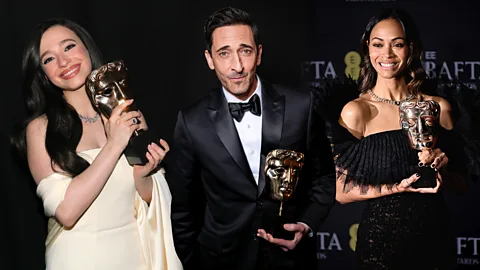Awards Watch: Why this is 'one of the closest and most thrilling Oscar races ever'
 Getty Images
Getty ImagesThe Baftas, which is often seen as a key indicator of where the Oscars are heading, left commentators none the wiser, paving the way for a tantalising finale to this year's awards season.
With less than two weeks to go until this year's Oscars, we've reached the stage where most of the results should be boringly easy to predict. Awards season gets going with the Golden Globes – held on 5 January this year – and in the weeks that follow there are so many prize-givings thrown by so many guilds and critics' associations that by the time the Oscars themselves roll around, they can seem anticlimactic. By then, everyone knows that Oppenheimer is going to win a stack of trophies, or that the best picture prize is a coin-flip between a couple of favourites – La La Land v Moonlight, Coda v The Power of the Dog – so what is there left to get excited about? Sometimes, the Oscars can feel like a round-up of all the preceding award ceremonies rather than a ceremony in itself.
Not this year. With several horses still neck and neck on the home stretch, this is one of the closest and most thrilling Oscar races ever. The odds keep changing, different awards bodies keep going in different directions, and pundits keep struggling to say with any confidence who the big winners are going to be. The Baftas sum up the glorious confusion. The British film industry's glitziest gala was held in London on Sunday evening, but the event, which is often seen as a key indicator of where the Oscars are heading, left commentators none the wiser.
Conclave won the prizes for best film, best British film, best adapted screenplay and best editing, so Edward Berger's exquisitely clever and well-crafted Vatican-set thriller, adapted from Robert Harris's novel, might seem to be a clear frontrunner at the Academy Awards. But the film's star, Ralph Fiennes, didn't win the best actor Bafta, an award for which he'd been widely tipped. Instead, the trophy went to Adrien Brody for The Brutalist – a film that also won Baftas for editing, score and director (Brady Corbet). Hmm. If the UK's voters were willing to honour Brody over Fiennes, a much-loved pillar of British cinema, should we be saying that the Oscar frontrunner is actually The Brutalist?
Well, maybe. But what about Anora? Sean Baker's dynamic anti-romantic comedy won best picture at the DGA, PGA, WGA and Critics Choice awards, so in the last week or two it has been nosing ahead of the competition. At the Baftas, it won prizes for best casting and best actress, and the latter prize, for Mikey Madison, seemed especially significant. Before Sunday, most commentators assumed that the Bafta would go to Demi Moore for The Substance, or Marianne Jean-Baptiste, the British star of Mike Leigh's Hard Truths, who hasn't even been nominated for an Oscar. But if the 25-year-old Madison can beat both of them, does that mean that she can beat Moore to the Oscar, despite Moore being the current favourite for best actress? Furthermore, does it mean that Anora itself now has the momentum to carry it all the way to the best picture prize? It's a narrative that seems almost convincing until you remember how many people expected Baker to win the best original screenplay Bafta for Anora, only for Jesse Eisenberg to nab it for A Real Pain.
One or two categories aren't so mystifying. Kieran Culkin won the best supporting actor Bafta for A Real Pain, having already won the Golden Globe among other awards, so he must have cleared some shelf space for his Oscar already. Meanwhile, Emilia Pérez won the Bafta for best film not in the English language, and its co-star, Zoe Saldaña, was named best supporting actress, so despite the calamitously bad publicity that Jacques Audiard's gangland musical has had during awards season, it is still in with a decent chance to win in those categories at the Oscars. It's probably no longer in the running for best picture, but James Mangold's Bob Dylan biopic, A Complete Unknown, has enough goodwill behind it to be a contender, and Timothée Chalamet could well beat Brody to the best actor prize. On the other hand, A Complete Unknown didn't win any Baftas at all, so... well, so it goes on.
Why is the race so tight? The main reason is that the list of best picture nominees is exceptionally strong this year, with an astonishing variety of excellent films. The only line-up to match it recently was last year's, but that brings us to reason two: Oppenheimer and Barbie were both commercial and critical smashes, whereas no film in the past 12 months has reached their level of all-conquering appeal. They all have their fans, but they all have their detractors, too. The only surefire winners are the people who produce the Academy Awards, and the people who tune in to see them. Never mind the speeches, the gaffes, and the song-and-dance numbers: for once, it's going to be the results which make the Oscars worth watching.
--
If you liked this story, sign up for The Essential List newsletter – a handpicked selection of features, videos and can't-miss news, delivered to your inbox twice a week.
